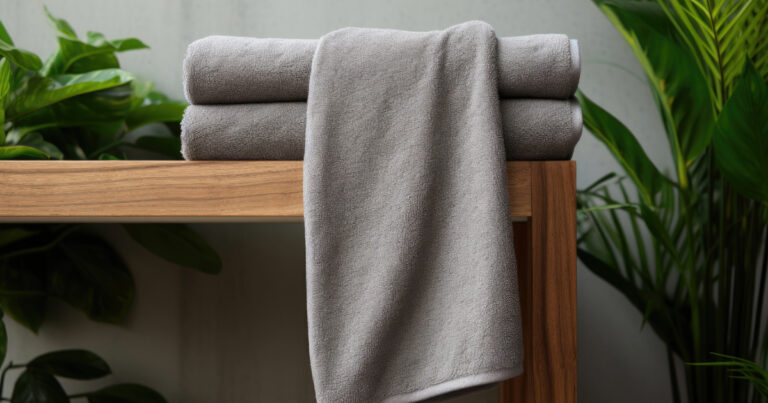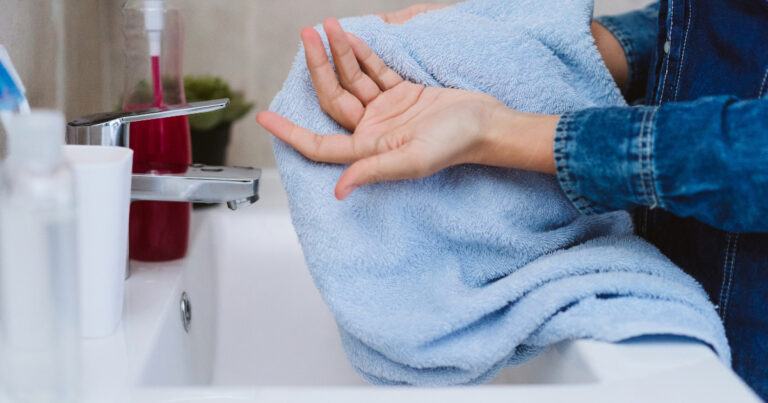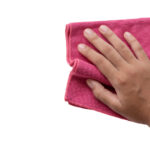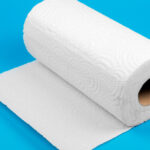Bath towels are essential items in any home. You likely use them every day after showering or bathing. But with frequent use comes wear and tear. So when should you replace your bath towels?
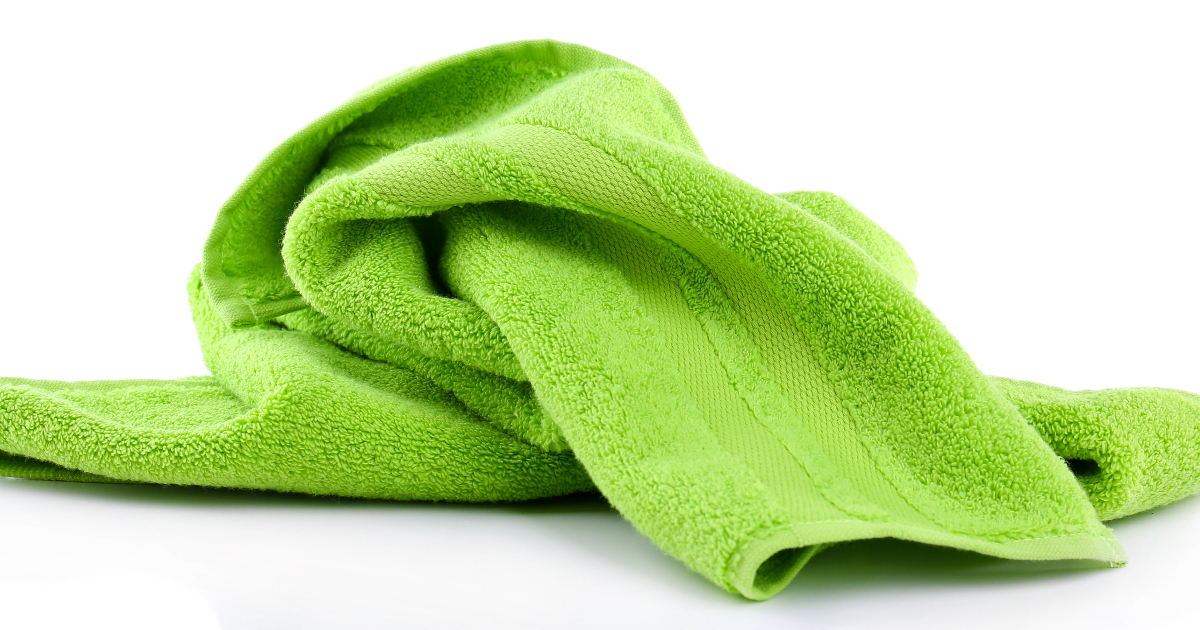
Knowing when it’s time to retire towels and invest in new ones ensures you’ll always have absorbent and hygienic towels on hand. Read on to learn the signs that indicate replacing towels is necessary, plus tips to extend towel lifespan.
How Often Should You Wash Bath Towels?
To keep bath towels fresh and bacteria-free, wash them frequently. Industry experts recommend washing bath towels after 3-4 uses. Here’s why:
Towels used frequently can become a breeding ground for bacteria if not washed regularly. Damp towels left bunched up are prone to developing mildew and smelling musty.
Frequent washing – every 3-4 uses – removes accumulated bacteria, body oils, and dead skin cells that can cause odors. It also restores fluffiness and absorbency.
For households with multiple bath towels, a good system is to use one towel between washes and keep the rest stored away. This prevents towels from staying damp too long before laundering.
Washing bath linens frequently promotes hygiene for all users, and extends the usable lifespan by preventing the buildup of grime.
How Often Should You Replace Bath Towels?
With proper care, high-quality bath towels can last up to 5 years or longer. But they gradually become less effective and eventually need replacing.
General guidelines recommend replacing bath towels every 2-3 years.
However, certain signs indicate when towels should be discarded sooner:
- Towels feel scratchy, thin, or rough on the skin
- Musty, sour or mildew smells linger after washing
- Sections are threadbare or fraying at the edges
- Holes, tears, or rips are present
- Towels fail to fully absorb water and dry skin
- Dingy stains don’t come out in the wash
- You’ve owned them for 5+ years even if no visible wear
While towels may still look presentable, ongoing use of worn and tattered linens increases the risk of transferring bacteria to freshly cleaned skin.
Periodically replacing old towels ensures you always have maximally soft, absorbent, and sanitary bath linens on hand.
Extending Lifespan of Bath Towels
You can lengthen the usable life of bath towels by following best practices for laundering, drying, and storage.
Here are expert-recommended tips for keeping towels in good condition longer:
- Wash in cold water using gentle, fragrance-free detergent
- Avoid bleach or harsh chemicals that degrade fibers
- Skip the fabric softener to maximize absorption
- Shake out towels before placing them in the dryer
- Dry on low or medium heat setting
- Fold or roll towels for storage; don’t leave them bunched up
- Allow towels to fully air dry between uses
- Wash dark towels separately to prevent fading
- Rotate towels so each one gets equal wear
Proper care slows the breakdown of fibers which diminishes softness and absorption over time. It also helps towels maintain their vibrant colors longer.
How Often Should You Replace Kitchen Towels?
Kitchen towels used for drying hands, dishes, and counters tend to need replacing more often than bath towels.
Here’s why:
- Greater exposure to food, grease, and cleaning chemicals
- Increased likelihood of collecting bacteria from raw meats/poultry
- Typically made from less durable, lower-quality materials
- Subjected to daily wear and tear
- Often left damp on counters or bunched up
- Frequent heat exposure when drying hot dishes
Industry guidance suggests replacing kitchen towels every 6 months to 1 year. Rotate multiple towels if possible, and launder them weekly or more often if visibly soiled. Discard any towels that are overly worn, feel rough, or have stains that don’t come out.
How Often Should You Replace Hand and Wash Towels?
Smaller hand and wash towels used at sinks receive frequent daily use. As such, they tend to show signs of aging faster than bath and kitchen towels. Here are general guidelines on their replacement timeframe:
- Hand towels – Replace every 1-2 years
- Washcloths – Replace every 6-12 months
Laundering hand and wash towels 1-2 times per week helps counteract heavy use. But the smaller sizes and lighter materials break down more rapidly with regular washing.
Don’t wait until these towels are tattered or full of holes. When texture feels rough or absorbency declines noticeably, it’s definitely time to switch them out for new.
How to Dispose of Old Towels
Once towels are too far gone for use in bathing or drying, they still have value and alternative applications.
Here are options for repurposing worn-out bath towels:
- Cut into squares for cleaning rags
- Donate to animal shelters for pet bedding or bathing
- Keep in the garage or shed for car washing/drying
- Use as drop cloths when painting or doing projects
- Tear into strips to make DIY rugs or mats
- Cut and hem into kid’s play towels
- Craft into bags, placemats, or other sewing projects
Reusing old towels is an environmentally friendly way to get more value before sending them to the landfill. Get creative and try to find new uses before tossing bath towels and linens.
Signs Towels Need Replacing Soon
Keep an eye out for these subtle signs that bath towels are nearing the end of their usable lifespan:
- The texture feels a bit scratchy or rough
- Takes longer to fully dry off after a shower
- Colors appear faded despite proper laundering
- A slight musty or sour odor develops
- Towels feel thinner and less fluffy
- Edges or hems just barely starting to fray
Catching towels when they begin declining in quality allows you to replace them before they become tattered or threadbare. Don’t wait until towels are in poor condition before investing in new linens.
FAQ
How do I know when my towels need replacing?
Towels need replacing when they become rough, or thin, fail to absorb water, or have visible tears, holes, or fraying. A sour, mildew smell that persists after washing also indicates replacement is needed.
Should I replace bath towels every year?
Most bath towels can last 2-5 years with proper care. But if towels receive extremely frequent use, yearly replacement may be warranted to ensure freshness and durability.
When should bath mats be replaced?
Industry guidance recommends swapping bath mats for new ones every 1-2 years. Launder them weekly and allow them to fully air dry to maximize lifespan.
How often should I buy new kitchen towels?
Due to frequent exposure to food, moisture, and cleaning agents, kitchen towels typically need replacing every 6-12 months.
How long do nice bath towels last?
High-quality towels made of Turkish cotton or bamboo can last upwards of 5 years with proper laundering and rotation. Hand towels and washcloths tend to need replacing more often.
Can old towels be recycled?
While not recyclable through curbside pickup, old towels can be recycled into insulation or sent to textile recycling centers. Donate or reuse towels when possible before placing them in the trash.
Conclusion
Like most household textiles, bath towels gradually decline with regular use and laundering. But towels made of quality materials like long-staple cotton or bamboo can remain soft, absorbent, and hygienic for several years with proper care.
Make inspecting and replacing towels part of your regular household maintenance routine. Bath towels used daily should be replaced approximately every 2-3 years for optimal performance. Hand towels, washcloths, and kitchen towels will likely need replacing more frequently due to their smaller size and heavier use.
Implementing best practices for laundering, drying, and storing towels helps extend their usable lifespan. But periodically investing in new bath linens is key to enjoying softer, fluffier, and more sanitary towels. With the right care and replacement schedule, you’ll always have fresh towels on hand.


